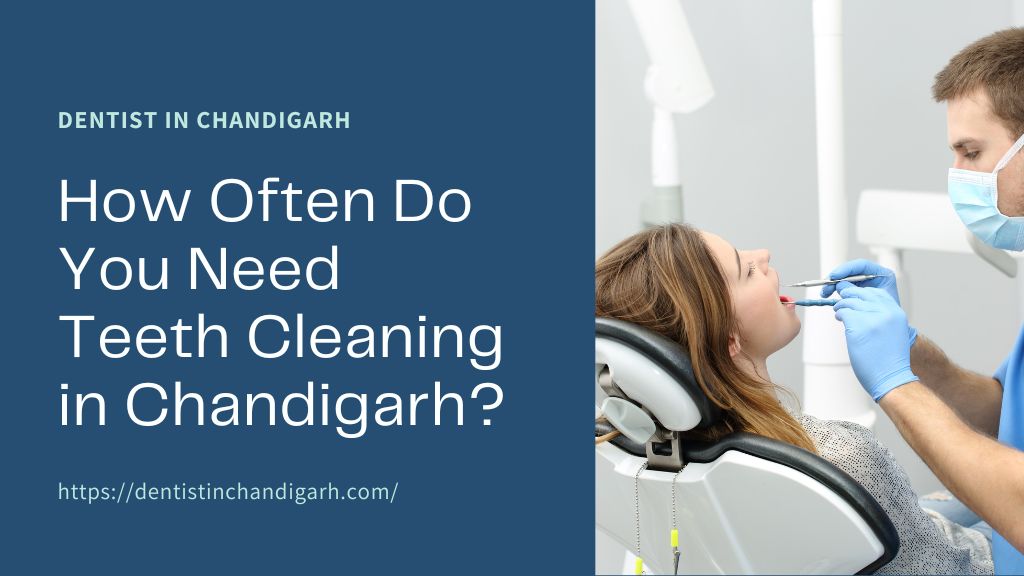Most people brush their teeth every morning and night. Some even floss daily. But even with good habits, many still face cavities, gum issues, or bad breath. Why? Because regular home care, while helpful, isn’t always enough.
There are tiny spaces in your mouth that a toothbrush and floss can’t fully clean. That’s where professional Teeth Cleaning makes a big difference.
Professional cleanings go deeper than your toothbrush can reach. They help prevent serious dental problems before they begin.
For people living in Chandigarh, where food habits and fast-paced lifestyles can affect oral health, regular dental visits are especially helpful.
This article explains how often you should get your teeth cleaned, what happens during the process, and why it matters for your smile and overall health.
Why Regular Dental Cleaning Is Important
What Happens During a Dental Cleaning?
During a dental cleaning, your dentist or hygienist does much more than just polish your teeth.
First, they use special tools to remove plaque, which is the soft, sticky layer of bacteria that builds up on your teeth.
If plaque isn’t removed in time, it hardens into tartar. Tartar can’t be removed with a regular toothbrush and needs professional tools to come off.
After removing plaque and tartar, your teeth are polished using a special paste. This helps clean surface stains and makes your teeth smoother, which slows future plaque buildup.
Your dentist might also floss your teeth to remove debris between them and rinse your mouth to leave it feeling fresh.
Compared to daily brushing and flossing, this professional process is more thorough and better at keeping your teeth and gums healthy.
For the most effective care, many people choose the best dentist in Chandigarh, who offers skilled, gentle cleanings to protect long-term oral health.
What Plaque and Tartar Can Do to Your Teeth
Plaque is filled with bacteria that feed on the food you eat—especially sugar. As they eat, these bacteria release acids that slowly damage your tooth enamel.
If not cleaned away regularly, plaque causes cavities. Worse, once it turns into tartar, it sticks firmly to your teeth and becomes even harder to remove.
Tartar can irritate your gums and lead to gingivitis—the early stage of gum disease. If ignored, this can progress to periodontitis, a more serious form of gum infection that may cause tooth loss.
Regular cleanings stop plaque and tartar from reaching these harmful stages. They also help your dentist spot early signs of these conditions so you can treat them right away.
How Often Should You Get Professional Teeth Cleaning?
General Recommendation
Dentists usually recommend a professional Teeth Cleaning every six months. That’s twice a year, which lines up well with most people’s dental insurance and overall health needs.
These regular cleanings are enough to remove buildup, check for early signs of decay, and keep your mouth feeling fresh.
Even if your teeth feel fine, a cleaning every six months helps prevent future problems. It’s similar to how we maintain our cars—even if it runs well, it still needs a service to avoid breakdowns later.
This schedule also gives your dentist a chance to monitor any changes in your oral health and make early interventions if necessary.
Waiting too long between cleanings can allow hidden problems to grow without you even knowing.
Factors That Might Require More Frequent Cleanings
Some people need more than just two cleanings a year. If you smoke or use tobacco, your mouth may produce more plaque and tartar than usual.
People with diabetes or weakened immune systems are also more prone to gum infections and may need to visit the dentist more often.
Braces, clear aligners, or other orthodontic appliances can make it harder to clean between teeth.
Patients with a history of gum disease or frequent cavities also benefit from more frequent cleanings, possibly every 3–4 months.
In these cases, cleanings are not just preventive—they’re essential for controlling existing issues.
If you’re someone who gets tartar quickly, has a dry mouth, or has poor brushing habits, your dentist may also recommend shorter intervals between cleanings.
Each person’s needs are different, and your dentist will help you decide what schedule works best for you.

Signs You May Need Teeth Cleaning Sooner
Even if your next scheduled appointment is months away, some signs suggest you should visit the dentist sooner. Persistent bad breath is one major signal.
When brushing, flossing, and using mouthwash don’t help, it could mean bacteria and plaque are trapped deep near the gums.
Bleeding gums while brushing or flossing may also point to gum irritation or infection. Don’t ignore this—early treatment can stop it from becoming serious.
Tooth sensitivity, especially to hot or cold drinks, might indicate enamel damage or buildup that needs professional cleaning.
Yellow teeth or dark stains near the gumline often show tartar that brushing alone can’t fix. If your teeth feel rough or sticky even after brushing, it might be time to get checked.
Ignoring these warning signs could lead to painful or costly dental problems later.
What Are the Benefits of Regular Cleanings?
There’s more to cleanings than just shiny teeth. One big benefit is preventing cavities. When plaque is cleaned away before it turns into acid, your enamel stays stronger.
This means fewer fillings and less chance of needing more serious dental work.
Healthy gums are another plus. Tartar and bacteria often collect at the gumline, causing inflammation.
Regular cleanings help stop this buildup and keep gums healthy and firm. You’ll also notice fresher breath since cleanings remove bacteria that cause bad odour.
Cleanings also help your smile look better. They can remove surface stains from foods and drinks, giving you a brighter, cleaner appearance.
Most importantly, they help catch dental issues early—like small cavities, early gum disease, or damaged fillings—before they grow into bigger problems.
Dental cleanings also support overall health. Some studies suggest gum disease is linked to heart problems and other conditions. Keeping your mouth healthy may benefit more than just your smile.
Is Teeth Cleaning Painful or Unsafe?
Addressing Common Fears
It’s common to feel a little nervous about dental visits, especially if it’s been a while. But teeth cleaning is generally a safe and simple procedure.
Most people feel only a bit of pressure or slight scraping. The feeling is more uncomfortable than painful—and it usually passes quickly.
If you’ve had a bad experience in the past, don’t worry. Dental tools today are better than ever, and most clinics use gentle techniques to keep patients comfortable.
If your gums are sore or inflamed, you might feel a bit more sensitivity during cleaning, but the process helps improve that over time.
Some people may also fear that cleaning could damage their enamel. This is a common myth. Professional tools are safe and only remove harmful buildup—not your tooth structure.
If you have special concerns, just speak to your dentist—they’ll explain each step and help make you feel at ease.
How Teeth Cleaning Fits Into Overall Oral Care
Brushing and flossing are important, but they’re only part of the picture. No matter how good your home care is, there are spots in your mouth—like behind the molars or below the gumline—that you simply can’t reach.
Professional cleanings help keep those areas clean and reduce your risk of serious dental problems.
Most dental visits for cleanings also include a full check-up. Your dentist will look for cavities, check gum health, examine your bite, and screen for early signs of serious problems like infections or oral cancer.
This combination of care is the best way to keep your mouth in top shape.
If you’re taking care of kids or older adults, their cleaning schedule is just as important. Children often need extra guidance in brushing and may benefit from cleanings every 6 months.
Older adults, especially those taking medications that affect saliva or bone health, may need more support to avoid decay or gum issues.
Why Location Matters: Dental Care in Chandigarh
Living in Chandigarh brings its own lifestyle and dietary habits that can affect oral health. The popular local diet often includes sweets, tea, and spicy foods—all of which can leave behind sugars, acids, or pigments that contribute to plaque and staining.
Many people in Chandigarh also lead busy lives, juggling work, studies, and family duties. With packed schedules, it’s easy to postpone dental appointments.
However, skipping cleanings can lead to problems that take even more time and money to fix later.
Luckily, dental care in Chandigarh is accessible and modern. The city has many experienced dentists using updated technology and patient-friendly techniques.
Whether you’re going for your first cleaning or catching up after a long break, finding help nearby is simple and worthwhile.
Conclusion
Professional dental cleanings are one of the easiest and most important things you can do for your smile.
Getting your teeth cleaned every six months keeps plaque under control, protects your gums, and lowers the risk of serious dental issues.
If you’re at higher risk due to health or habits, more frequent cleanings may be needed.
You don’t have to wait until there’s a problem. Paying attention to signs like bleeding gums or bad breath helps you know when it’s time for a visit.
And if it’s been a while since your last cleaning, now’s a great time to schedule one. The team at Dentist in Chandigarh is here to help you maintain a healthy, confident smile for years to come.


